Brown Collection- Maid Freed from the Gallows
["Maid Freed" titles have been assigned by various collectors and will be changed (as individual versions) to titles based on the text.
R. Matteson 2015]
OLDER BALLADS MOSTLY BRITISH
30. The Maid Freed from the Gallows (Child 95)
For preceding records of this ballad and its relation to theories of communal origin, see BSM 66, adding to the references there given New Hampshire (NGMS 117-18), Kentucky (BTFLS in 95), Tennessee (SFLQ xi 129-30), North Carolina (FSRA 35-6), Florida (FSF 295-9), Arkansas (OFS i 146-8), Missouri (OFS I 143-4, 145), Ohio (BSO 62-4), Indiana (BSI 125-7), and Michigan (BSSM 146-8 — this last being the "golden ball" form, rare in this country). In only half of the North Carolina texts is it a woman that waits to be freed from the gallows ; in versions B C E K L it is a man, and in D the sex is indeterminate. D is the only one of our texts in which the song has been turned into a play.
A. 'The Maid Freed from the Gallows.' From the collection of Miss Isabel Rawn (later Mrs. W. T. Perry), who got it from Belvia Hampton of Warne, Clay county, in 1915.
1 'Oh hangman, oh hangman,
Wait for a little while;
I see my father coming;
He's rode a many long mile.
2 'Oh father, oh father, did you bring me any gold,
Or did you bring me free,
Or have you come to see me hung
Upon the sorrowful tree?'
3 'Oh daughter, oh daughter, I did not bring you gold,
Nor did I bring you free;
But I have come to see you hung
Upon the sorrowful tree.'
This three-stanza form is repeated for mother, brother, and lover; but the lover's reply is different:
12 'Oh sweetheart, oh sweetheart, I did bring you gold
And I did bring you free,
But I did not come to see you hung
Upon the sorrowful tree.'
B. 'Maid Freed from the Gallows' — so the caption runs, though it is here a man, not a maid, that is freed. This version also is from Miss Rawn's collection, further source and date not indicated. The language is slightly different from that of A, and the series is reduced to father, mother, and sweetheart.
1 'Hangman, oh hangman!
Slacken up your rope;
I think I see my father coming,
He's rode many a long mile.
2 'Oh father, oh father, did you bring me any gold.
Or did you bring me free.
Or did you come to see me hung
Upon the gallows tree?'
3 'Oh son, blessed son, I did not bring you gold
Nor did I bring you free,
But I have come to see you hung
Upon the gallows tree.'
Similarly for the mother; but when the sweetheart appears, her answer runs:
9 'My lover, my lover, I did bring you gold
And I did bring you free.
But I did not come to see you hung
Upon the gallows tree.'
And the man says:
'Oh hangman, oh hangman, slacken your rope;
From the gallows I will go.
For to my love, my sweetheart,
Belongs my life, you know.'
C. 'The Gallows Tree.' Contributed by Mrs. Sutton, but she does not say which of her many mountain singers furnished this particular text. "I've heard it down in Caldwell, in Buncombe, in Avery, Mitchell, and Burke." Once she heard it " 'on the road.' The long red road from Cranberry to Plumtree, and the singer was a lovelorn damsel whose lover had recently been in trouble. . . . She looked as if the heroine's solution of her problem had its appeal for her, and her mother said, 'Lulu's been singin' too many lonesome tunes sence her trouble.' " And of the tune, as sung by a Mrs. Walter, Mrs. Sutton says: it "is very weird, high and rather dififerent from most ballads. She sang it in a nasal tone and so very strained that my throat ached in sympathy." As a typical version this text is given in full.
1 'Hangman, hangman, slack up your rope,
Oh slack it up for awhile.
I've looked over yonder and I see Pap a-comin';
He's walked fur many a mile.
2. 'Oh Pap, oh Pap, have you brought me any gold,
Any gold fur to pay my fee ?
Or have you come to see me hanged,
Hanged high on the gallows tree?'
3. 'Oh Boy, oh Boy, I've brought you no gold.
No gold fur to pay your fee.
But I've just come fur to see you hanged,
Hanged high on the gallows tree.'
4. 'Hangman, hangman, slack up your rope,
Oh slack it up for a while.
I've looked over yonder and see Mam a-comin';
She's walked fur many a mile.
5. 'Oh Mam, oh Mam, have you brought any gold,
Any gold fur to pay my fee?
Or have you come fur to see me hanged,
Hanged high on the gallows tree?'
6. 'Oh Boy, oh Boy, I've brought you no gold.
No gold fur to pay your fee;
I've just come fur to see you hanged.
Hanged high on the gallows tree.'
7. 'Hangman, hangman, slack up your rope.
Oh slack it up fur a while.
I've looked over yonder and I see Sis a-comin';
She's walked fur many a mile.
8. 'Oh Sis, oh Sis, have you brought me any gold,
Any gold fur to pay my fee?
Or have you come to see me hanged.
Hanged high on the gallows tree?'
9. 'Oh Boy, oh Boy, I've brought you no gold,
No gold fur to pay your fee,
I've just come fur to see you hanged,
Hanged high on the gallows tree.'
10. 'Hangman, hangman, slack up your rope,
Oh slack it up a while.
I've looked over yonder and seed Sweetheart comin';
She's rode fur many a mile.
11. 'Sweetheart, Sweetheart, have you brought me any gold,
Any gold fur to pay my fee?
Or have you come fur to see me hanged,
Hanged high on the gallows tree?'
12 'Oh yes, oh yes, I've brought you some gold.
Some gold fur to pay your fee ;
My own true love shall never be hanged,
Hanged high on the gallows tree.'
D. 'My Father Oh No.' Mrs. Sutton describes this use of the song as a child's game: "My nurse, a little nigger from Newberry, S. C, was playing a sort of dialogue game with my children. It is a corrupted arrangement of the 'Maid Freed from the Gallows' or 'Hangman's Song.' It goes like this:
My father oh no, my father oh no,
Have you brought me any silver or gold?
Oh no, oh no, oh no, oh no
I didn't bring you no silver and gold.
I came to you, I came to you,
I came to see you hanged, my dear.
You need a shady tree.
"It follows the usual rigmarole — Father, Mother, Brother, Sister, and Sweetheart. My oldest, Betty, was the 'maid.' The nurse the relatives and friends. The little nigger said she learned it down home."
E. 'The Maid Freed from the Gallows.' As sung by Monroe Ward on Bushy Creek, Watauga county, in 1936. The series here is mother, father, sister, brother, sweetheart. It begins
Oh Georgy, hold up your hands for me.
For I see your mother coming
Just about a hundred miles,'
in which the pronouns are confused, or at least confusing. The sweet-
heart's answer, at the end:
'I have brought you gold,
I have brought you fee.
And I have come to marry you
And take you away with me.'
F. 'Hangman, Hangman.' Contributed by Henry Belk of Monroe, Union county, in 1919. In this version the dialogue is somewhat abbreviated, and her old true love's answer differs slightly from the usual form. It begins:
I 'Hangman, hangman, go slacken your rope.'
Her father rode for many a long mile.
'Have you got my gold or paid my fee?'
'No, I have not got your gold or paid your fee.
For I have come to see you hung.'
And so on through mother, brother, sister, ending with her true love:
5 'Hangman, hangman, go slacken your rope.'
Her old true love rode for many a long mile,
'Have you got my gold or paid my fee?'
'No, I have not got your gold, but have paid your fee,
For I have come not to see you hung.'
G. 'Hangman Song.' Sent in in September 1922 by Miss Cora Lee Wyatt, as sung by John Duncan of Spruce Pine, Mitchell county. The series is father, mother, brother, sister, true lover; the gallows is "yonder lonesome tree"; and it ends:
'My sweetheart, dear sweetheart, I've brought you gold,
And I've brought you free;
For I've not come to see you hang
On yonder lonesome tree.'
H. 'True Love.' Reported by Mrs. R. D. Blacknall of Durham as sung by the Misses Holeman in July 1922. They had learned it from the singing of a "negro servant, Maria McCauley, presumably ex-slave of the Chapel Hill McCauleys. Heard forty-five years ago." The series is father, mother, brother, sister, true love. Ends:
'O did you bring me gold?
O did you pay my fee.
Or have you come for to see me hung
On yonders willow tree?'
O I did bring you gold,
And I did pay your fee.
And I have not come for to see you hung,
For that thing it never shall be!'
I. 'The Hangman's Tree.' Contributed by Miss Clara Hearne, principal of the high school at Roanoke Rapids, Halifax county, in 1923. The series is father, brother, sister, sweetheart. Nothing distinctive in the language or form.
J. 'Maid Freed from the Gallows.' Contributed by Miss Bonnie Ethel Dickson. The manuscript shows neither place nor date. The series is father, mother, brother, sister, true love. [MS in Abrams from Lottie L. Dickson dated 1938; titled "The Maid on the Gallows"]
K. ['Johnny Low'] Contributed by Professor M. G. Fulton of Davidson College in 1914 or 1915. Since this has already been published in the Virginia collection (TBV 380-1) it is not reproduced here. It is highly exceptional, the series being friend, brother, sister, mother — who effects his release. The introductory lines in each section are
Johnny Low, Johnny Low, my good Johnny, Johnny Low,
Just pass your hands awhile,
against which Dr. Brown has noted 'Johnny Low should probably be Johnny Law,' but without saying why he thought so. Each section but the last ends
I come this day to see you hung,
And hung, you shall be hung,
and the closing line in the last section differs only by inserting "not'' after "shall."
L. A two-stanza fragment secured by Julian P. Boyd from Minnie Lee, one of his pupils in the school at Alliance, Pamlico county, in 1927. The quotation marks are the editor's, conjectural.
'Stand back, stand back, pretty little Johnson!
Stand back for a great while.
See if you see your mother a-coniing,
A-coming many a mile !'
'Have you brought my gold and silver?
Have you paid my way?
Have you come for to see hanging?
For hanging you shall see.'
M. 'The Highway Man.' From the John Burch Blaylock Collection. This differs widely from the ordinary versions by beginning (stanzas 1-3) with matter from widespread convicts' songs. [For a similar text see Henry, Version E, possibly taken from Charlie Poole's 1926 recording, The Highwayman.]
1 As I went down to the old depot
To see the train roll by,
I thought I saw my dear old girl
Hang her head and cry.
2 The night was dark and stormy;
It sure did look like rain.
Not a friend in the whole wide world,
And no one knew my name.
3 No one knew my name, poor boy,
No one knew my name;
Not a friend in the whole wide world.
And no one knew my name.
4 'Go away, Mr. Judge, go away, Mr. Judge,
Just wait a little while.
I think I saw my dear old girl
Walk for miles and miles.
5 'Dear girl, have you brought me silver?
Dear girl, have you brought me gold?
Have you walked these long, long miles
To see me hanged upon the hangman's pole?'
6 'Dear boy, I've brought you silver,
Dear boy, I've brought you gold;
I have not walked these long, long miles
To see you hanged upon the hangman's pole.'
7 She took me from the scaffold;
She untied my hands;
The tears ran down the poor girl's cheeks:
'I love this highway man.'
------------------------------------------
30. The Maid Freed from the Gallows (Child 95) [Music]
A. 'The Maid Freed from the Gallows.' From the collection of Miss Isabel Rawn. Sung by Miss Belvia Hampton. Recorded at Warne, Clay county, in 1915. The first two measures with up-beat are identical with those of the Nora Hicks' version of 'Little Musgrove and Lady Barnard' (26G) as well as the E. Sanders' version of 'Leap Frog John' (vol. V). The fourth and fifth measures remind one of 'Oh, Susanna.'
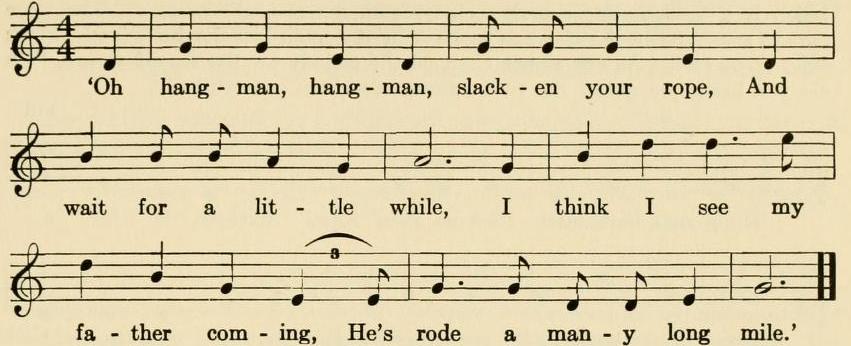
For melodic relationship cf. *SharpK I No. 28A, measures 1-2. Scale: Mode III, plagal. Tonal Center: g. Structure: abca1 (2,2,2,2) = ah (4,4).
B. 'Maid Freed from the Gallows.' From the same collection as A and with the same tune, but by an anonymous singer.
C. 'The Gallows Tree.' Sung by Mrs. Walter. Recorded as ms score; no date or place given. Measures 2 and 6 are practically the same as in 30O.
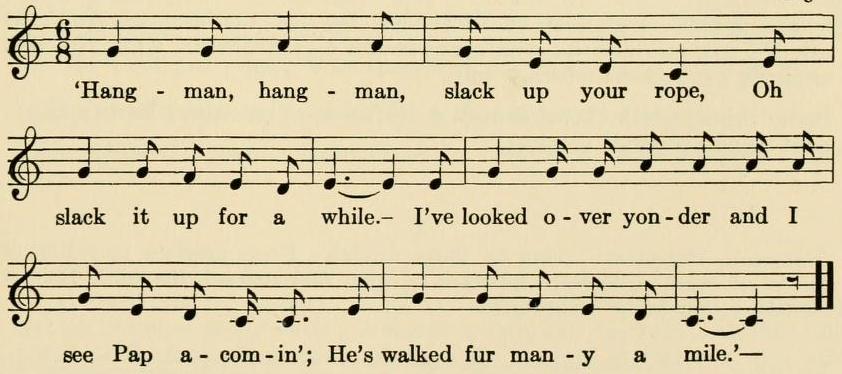
For melodic relationship cf. *FSSH 95, version A, melodic outline only. Scale: Hexachordal. Tonal Center: c. Structure: abab1 (2,2,2,2) = aa1 (4,4).
H. 'True Love.' Sung by Miss Jean Holeman. Recorded at Durham in July 1922, Other titles given are 'Maid Freed from the Gallows' and 'Hangman, Hangman'. The first four measures are the initial phrase of 'lam Christus astra ascenderat,' which is a Whitsuntide church melody from the eleventh century. The same tune is also used in the German hymn 'Christ der du hist der helle Tag,' which dates from 1568. As our singer changed the melody for the second stanza, "Oh did you bring me gold," the two stanzas are given consecutively.
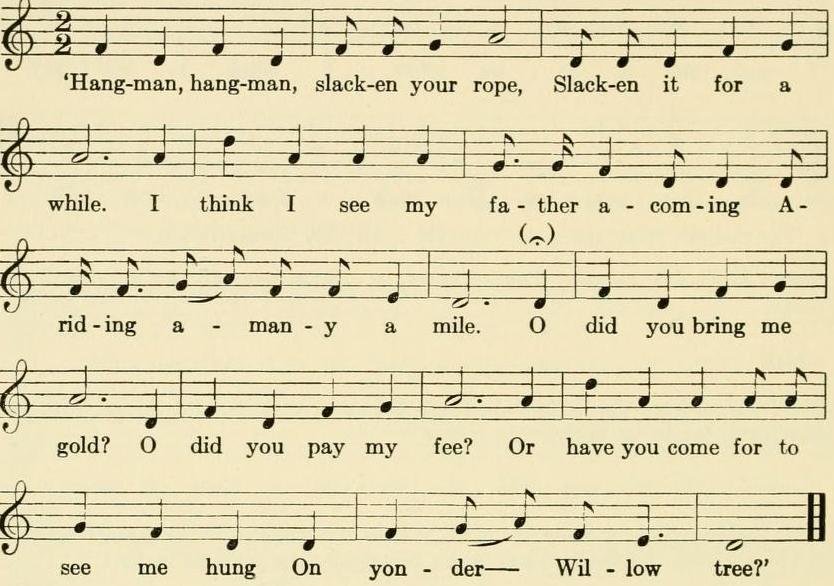
For melodic relationship cf. ***SFSEA 159, No. 142, measures 8-10, and 237, No. 245, measures 1-4 with our measures 9-12. **SharpK i 162, No. 28B, measures 5-6, melodic tendency only.
Scale: Pentachordal. Tonal Center: d. Structure: (ist stanza) abed (2,2,2,2); (2nd stanza) b1b2c1d1 (2,2,2,2).
N. 'Hangman, Hangman.' Sung by Steve Church. From previous recording of Dr. W. A. Abrams, Boone, September 14, 1941. Our stanza is the third. Neither sweetheart nor father brings gold.


For melodic relationship cf. **SharpK I 162, No. 23B ('Little Musgrave and Lady Barnard'), measures 1-2. Scale: Hexatonic (4), plagal. Tonal Center: e-flat. Structure: abb1a1 (2,2,2,2).
O. 'Hangman's Song.' Sung by Belvia Hampton. Recorded as ms score, no date or place given. There is no text for Belvia Hampton's second version. On the other hand, there is no tune for John Duncan's text (version 30G) sent in by Miss Cora Lee Wyatt. Since the latter, however, fits the former perfectly, it was so used. Measures 2 and 6 are practically the same as those in 30C.
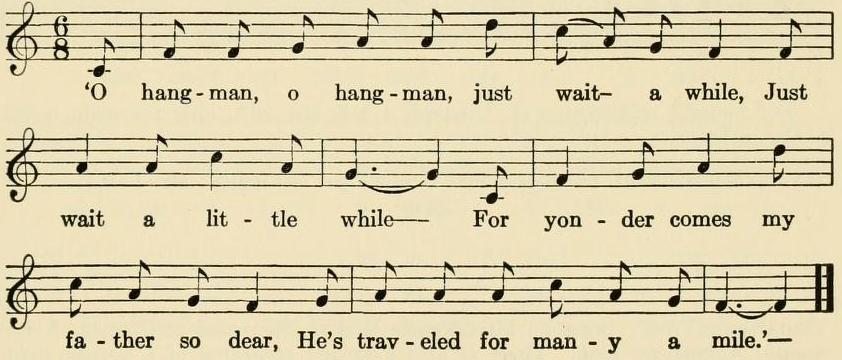
Scale: Mode III, plagal. Tonal Center: f. Structure: abab1 (2,2,2,2) = aa1 (4,4).
P. 'Maid Freed from the Gallows.' Sung by Frank Proffitt, with guitar. Recorded at Pick Britches, Sugar Grove, Watauga county, July 24, 1939. Another title given is 'Hangman, Hangman.' The melodic material of measures 2, 5, and 6 of this version is the same as that of 30A, but what a difference in the use made of it! The harmony inflicted upon this melody by the guitar player is a fine example of experimentation with a totally unknown quantity! [see text in Warner]

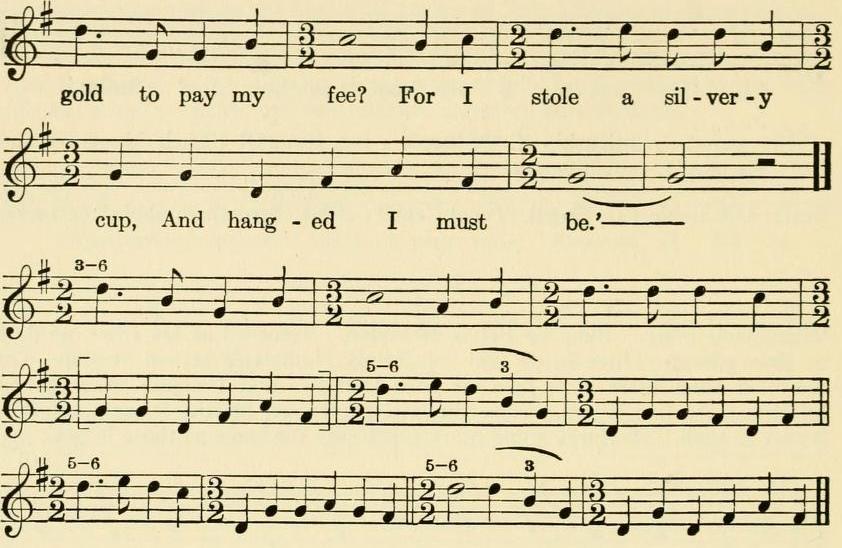
For melodic relationship cf. *SharpK i 208, No. 28A, only the main points of the melody. Scale: Heptachordal, plagal. Tonal Center: g. Structure: abc (2,2,4).
P. "A Silvery Cup"- Sung by Frank Proffitt w/guitar, 1939 Beech Mountain, NC. Learned from his (great) aunt Nancy Prather.
Listen: http://omeka.library.appstate.edu/files/original/9364d1f3d3937aeb9d950aca0f14574e.mp3
Hold up your hand Old Joshuay[1] she said,
Wait a while and see,
I thought I seen my (own) father dear
Come crossing over the sea.
Have you got any money for me
Or gold for to pay my fee?
For I have stole a silvery cup,
And hang-eth I must be.
I don't have no money for you,
Gold to pay your fee,
I've just come to see you hang,
On yonders gallows tree.
[Same for: "own dear mother," "my own fair lover," last time "true love":]
Hold up your hand Old Joshuay she said,
Wait a while and see,
I thought I seen my true love
Crossing over the sea.
Have you got any money for me
And gold to pay my fee?
For I have stole a silvery cup,
And hang-eth I must be.
Yes I have the money for thee,
Gold to pay your fee
I have come to save your neck
From yonders gallow tree.
1. Lord Joshuay for "Lord Judge"
Q 'Hangman's Tree.' Sung by Miss Pearle Webb. Recorded at Pineola, Avery County, August 24, 1939. There is also a second recording of a version sung by Mrs. Anna Johnson
[Mrs Avery Johnson, recorded a version of The Highwayman, the text ends "hangman's pole." Webb's melody is very similar to Johnson's and I assume they are both "Highwayman" versions.], which differs only in a few points from this version, and from which the first set of variations are taken.
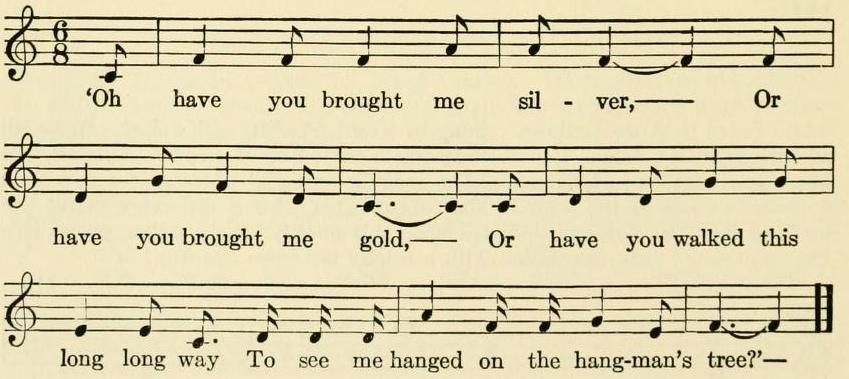

Scale: Hexatonic (4), plagal. Tonal Center: f. Structure: abed (2,2,2,2).
R. 'The Gallows Tree.' Sung by Mrs. James York. Recorded at Olin, Iredell county, August 24, 1939. Melodic deviations in another recording are given in the variations below.
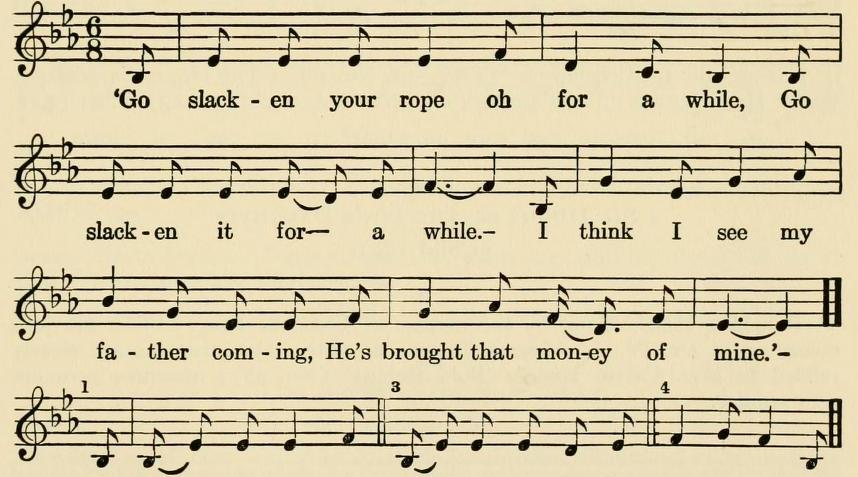
For melodic relationship cf. **SharpK I 214, No. 28K, measures 1-4; FSF 297. Scale: Heptachordal. Tonal Center: e-flat. Structure: aa1bc (2,2,2,2) = ab (4,4).